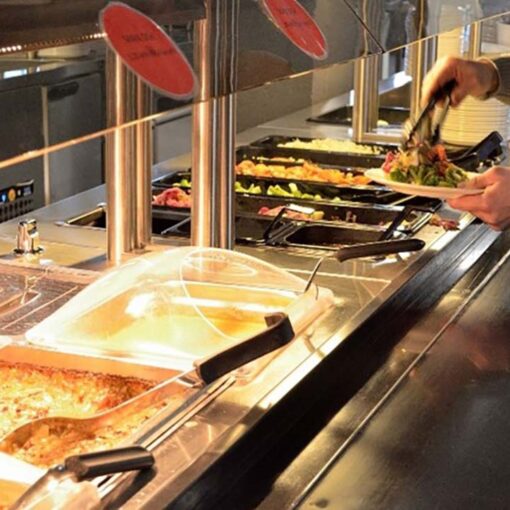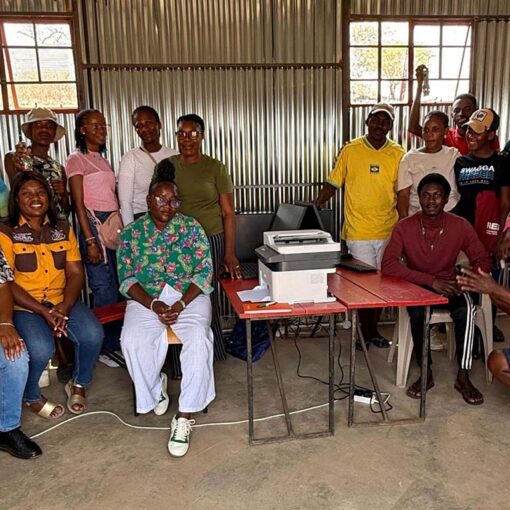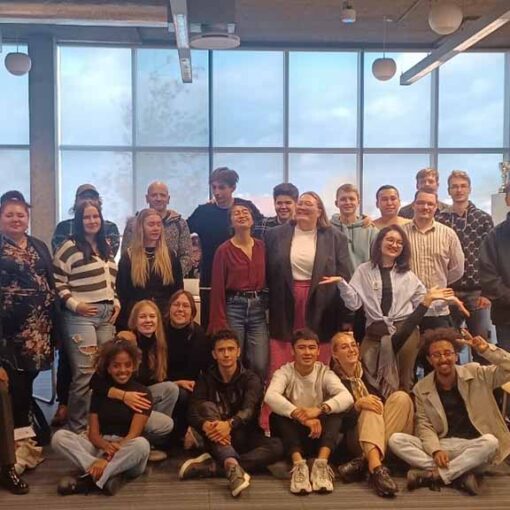The SmartVille project has been actively engaging with Zambian and Namibian communities to co-develop formal and informal entrepreneurial learning content (LAB 2024). In September 2024, project members visited the Luanshimba and Kasisi Living Lab communities in Zambia, conducting focus group discussions to identify key entrepreneurial capacity gaps. Similar focus group discussions took place in Namibian Living Lab villages Mix Settlement and Nauaspoort in October 2024. Findings highlighted the need for training in bookkeeping, marketing, agribusiness management, and cooperative leadership, among others. To bridge these gaps, courses tailored to community needs are designed in collaboration with SmartVille project partners. (Saarijärvi & Mufeti 2024)
A central tool in this process is the LUT-4SUS framework, which provides a structured approach for developing sustainable and impactful formal and informal courses. The LUT-4SUS tool was created as part of a research project “Carbon Neutral Startups (CARNES)” for startups to analyze and develop the business ideas towards the carbon neutrality and to gain positive carbon handprint for entrepreneurs to adjust and take advantage of carbon neutral thinking as a competitive advantage when entering the (international) markets. (LUT 2022). The tool however is not limited only to startups but can be used at any maturity level of the businesses.
Integrating sustainability, inclusitivity, and practice
The LUT-4SUS tool provides guidance for the SmartVille partner HEIs to structure entrepreneurship education in a way that integrates sustainability, inclusivity, and practical application. The LUT-4SUS tool does not require any numerical data but encourages businesses for critical thinking of their sustainability impact through self-assessment. The tool is focusing on four categories; Need (does the business address a real, long-term necessity), Sustainability of the Business Model (how is sustainability integrated into the company’s strategy and everyday business operations), Impacts and Emissions (what are the environmental and social effects of the business), and Materials and Energy (how does the business use resources, and are they renewable). (LUT 2022).
![[Alt text: a graphic presentation which combines need, sustainability, impact and materials.]](https://blogit.lab.fi/labfocus/wp-content/uploads/sites/8/2025/04/131_2025_Leveraging-LUT-4SUS-for-co-creating-entrepreneurship-courses-1024x573.jpg)
Utilizing LUT-4SUS in course design
The LUT-4SUS provides a framework for designing courses that embed sustainability in entrepreneurial education. The informal courses to be developed for the Living Lab communities have been identified by the conducted focus group discussions. Participatory learning (team learning method) is introduced to ensure that knowledge is co-created rather than imposed (LAB 2024).
Sustainability can be seen to be a critical component of the courses to be created. For instance, the Sustainable Agripreneurship course in Kasisi Living Lab, facilitated by University of Lusaka in Zambia, will integrate sustainability principles to help farmers manage resources efficiently (Saarijärvi & Mufeti 2024), using LUT-4SUS as a tool in the course development. In courses facilitated by Mulungushi University, to be provided in the Luanshimba Living Lab in Zambia, as well as in the Namibian Living Lab sites in Mix Settlement (facilitated by Namibia University of Science and Technology), and Nauaspoort (facilitated by University of Namibia), the LUT-4SUS tool can be used as a framework for integrating sustainability into the courses.
The SmartVille project’s aim is to ensure that entrepreneurship education is not only relevant and community-driven, but also sustainable in the long term. One of the main concerns raised by the Living Lab community members was ensuring the long-term sustainability of the Living Labs beyond the two-year project. After the SmartVille project ends in December 2025, the Living Labs should continue to operate self-sufficiently, with the framework of sustainability.
Author
Mia Ekman works as a Senior Lecturer in the Faculty of Business in LAB University of Applied Sciences. Currently works also as a project manager in the Developing Sustainable and Entrepreneurial Villages through Educational Living Labs in Namibia and Zambia (SmartVille) project.

References
LAB. 2024. Developing Sustainable and Entrepreneurial Villages through Educational Living Labs in Namibia and Zambia. Project. LAB University of Applied Sciences. Cited 2 Apr 2025. Available at https://lab.fi/en/project/developing-sustainable-and-entrepreneurial-villages-through-educational-living-labs-namibia
LUT-4SUS. 2022. Cited 3 Apr 2025. Available at https://research.lut.fi/converis/portal/detail/Project/14119931?auxfun=&lang=en_GB
Saarijärvi, T. & Mufeti, K. 2024. SmartVille project team creates entrepreneurial learning contents for Living labs. LAB Focus. Cited 2 Apr 2025. Available at https://blogit.lab.fi/labfocus/en/smartville-project-team-creates-entrepreneurial-learning-contents-for-living-labs/




